30912 Sunday to 51012 Friday LESSON 713 FREE ONLINE eNālāndā Research and Practice UNIVERSITY through http://sarvajan.ambedkar.org-Dhammapada Verses 368 to 376 Sambahulabhikkhu Vatthu-Verse 368. The Monk Who Radiates Loving-Kindness Radiates Peace-Verse 369. Give Up Lust And Hatred-Verse 370. Flood-Crosser Is One Who Has Giver Up The Fetters-Verse 371. Meditate Earnestly-Verse 372. There Is No Wisdom In Those Who Do Not Think-Verse 373. He Who Is Calm Experiences Transcendental Joy-Verse 374. He Is Happy Who Reflects On Rise And Fall-Verse 375. A Wise Monk Possess His Cardinal Virtues-Verse 376. A Monk Should Be Cordial In All His Ways
 |
Verse 368. The Monk Who Radiates Loving-Kindness Radiates Peace
Explanation: The monk who extends loving-kindness to all, |
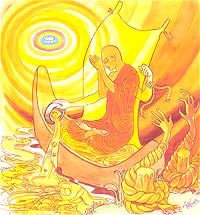 |
Verse 369. Give Up Lust And Hatred
Explanation: O monk, your boat must be emptied of the water |
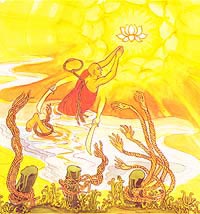 |
Verse 370. Flood-Crosser Is One Who Has Giver Up The Fetters
Explanation: One should break away from the five lower fetter. |
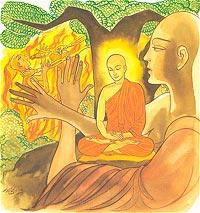 |
Verse 371. Meditate Earnestly
Explanation: O monk, meditate and do not be indolent. Do not |
 |
Verse 372. There Is No Wisdom In Those Who Do Not Think
Explanation: For one who lacks meditation there is no wisdom. |
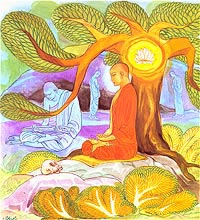 |
Verse 373. He Who Is Calm Experiences Transcendental Joy
Explanation: A monk who enters an empty house, whose mind |
 |
Verse 374. He Is Happy Who Reflects On Rise And Fall
Explanation: When the meditator reflects upon the raise and |
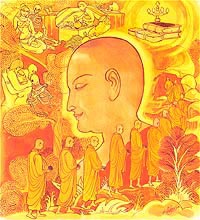 |
Verse 375. A Wise Monk Possess His Cardinal Virtues
Explanation: The joy experienced as a fore taste of Nibbana, |
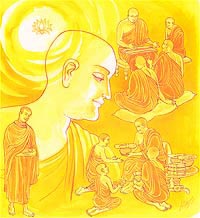 |
Verse 376. A Monk Should Be Cordial In All His Ways
Explanation: One should be courteous and of pleasant behaviour. |
Dhammapada Verses 368 to 376
Sambahulabhikkhu VatthuMettavihari yo bhikkhu
pasanno buddhasasane
adhigacche padam santam
sankharupasamam sukham.Sinca bhikkhu imam navam
sitta te lahumessati
chetva raganca dosanca
tato nibbanamehisi.Panca1 chinde
panca2 jahe
panca3 cuttari bhavaye
pancasangatigo4 bhikkhu
“oghatinno” ti vuccati.Jhaya bhikkhu ma pamado
ma te kamagune ramessu cittam
ma lohagulam gili pamatto
ma kandi “dukkhamidan” ti dayhamano.Natthi jhanam apannassa
panna natthi ajhayato
yamhi jhananca panna ca
sa ve nibbanasantike.Sunnagaram pavitthassa
santacittassa bhikkhuno
amanusi rati hoti
samma dhammam vipassato.Yato yato sammasati
khandhanam udayabbayam
labhati pitipamojjam
amatam tam vijanatam.Tatrayamadi bhavati
idha pannassa bhikkhuno
indriyagutti santutthi
patimokkhe ca samvaro.Mitte bhajassu kalyane
suddhajive atandite
patisantharavutyassa
acarakusalo siya
tato pamojjabahulo5
dukkhassantam karissati.Verse 368: The bhikkhu who lives exercising
loving-kindness and is devoted to the Teaching of the Buddha will realize
Nibbana — the Tranquil, the Unconditioned, the Blissful.Verse 369: O bhikkhu, bale out the water (of
wrong thoughts) from this boat (your body); when empty it will sail swiftly;
having cut off passion and ill will you will realize Nibbana.Verse 370: Cut off the five (the lower five
fetters) give up the five (the upper five fetters); and develop the five
(controlling faculties). The bhikkhu who has freed himself of the five bonds
(passion, ill will, ignorance, pride and wrong view) is called “One who has
crossed the flood (of samsara).”Verse 371: O Bhikkhu, mediate, and do not be
unmindful; do not let your mind rejoice in sensual pleasures. Do not be
unmindful and swallow the (hot) lump of iron; as you burn (in niraya) do
not cry, “This, indeed, is suffering.”Verse 372: There can be no concentration in
one who lacks wisdom; there can be no wisdom in one who lacks concentration. He
who has concentration as well as wisdom is, indeed, close to Nibbana.Verse 373: The bhikkhu who goes into seclusion
(to meditate), whose mind is tranquil, who clearly perceives the Dhamma,
experiences the joy which transcends that of (ordinary) men.Verse 374: Every time he clearly comprehends
the arising and the perishing of the khandhas, he finds joy and rapture.
That, to the wise, is the way to Nibbana (the Deathless).Verse 375: For a wise bhikkhu in this
Teaching, this is the beginning (of the practice leading to Nibbana): control of
the senses, contentment, and restraint according to the Fundamental Precepts.Verse 376: Associate with good friends, who
are energetic and whose livelihood is pure; let him be amiable and be correct in
his conduct. Then, (frequently) feeling much joy he will make an end of dukkha
(of the round of rebirths).
1. The lower five fetters (Orambhagiya
samyojana) are: ego belief (sakkayaditthi); doubt (vicikkiccha); wrong views of
morality and practices (silabbataparamasa); sensual desire (kamaraga) and ill
will (byapada). These can be got rid of by the first, second and third Maggas.2. The upper five fetters (Uddhambhagiya
samyojana) are: craving for fine material existences (rupa raga); craving for
non-material existences (arupa raga); pride (mana); restlessness (uddhacca) and
ignorance (avijja). These five can be got rid of by arahatship.3. The five controlling faculties (Pancindriya)
are: faith (saddha); diligence (viriya); mindfulness (sati); concentration (samadhi)
and wisdom (panna).4. The five sangas are: passion, ill will,
ignorance, pride and wrong views.5. pamojjabahulo: lit., much joy;
according to the Commentary, in this context, frequently feeling joy.
The Story of a Great Many Bhikkhus
While residing at the Jetavana
monastery, the Buddha uttered Verses (368) to (376) of this book, with reference
to nine hundred bhikkhus.Once there was a very rich lady
in the town of Kuraraghara, about one hundred and twenty yojanas from
Savatthi. She had a son who had become a bhikkhu; his name was Sona. On one
occasion, Bhikkhu Sona passed through his home town. On his return from the
Jetavana monastery his mother met him and organized a grand charity in his
honour. Having heard that Bhikkhu Sona could expound the Dhamma very well she
also requested him to expound the Dhamma to her and other people of the home
town. Bhikkhu Sona complied with her request. So a pavilion was built and a
meeting was organized for Bhikkhu Sona to give a discourse. There was a large
gathering at the pavilion; the mother of the bhikkhu also went to listen to the
Dhamma expounded by her son. She took all the members of her household with her
leaving only a maid to look after the house.While the lady was away, some
thieves broke into the house. Their leader, however, went to the pavilion where
the mistress of the house was, sat down near her and kept an eye on her. His
intention was to get rid of her should she return home early on learning about
the theft at her house. The maid seeing the thieves breaking into the house went
to report the matter to her mistress, but the lady only said, “Let the
thieves take all my money, I don’t care; but do not come and disturb me while I
am listening to the Dhamma. You’d better go back.” So the maid went home.There the girl saw the thieves
breaking into the room where her mistress kept all her silverware. Again she
went to the pavilion where her mistress was and reported to her that the thieves
were taking away her silverware, but she was given the same answer as before. So
she had to go back to the house. There she saw the thieves breaking into the
room where her mistress kept her gold and she reported the matter to her
mistress. This time, her mistress shouted at her, “O dear! Let the thieves
take whatever they wish to take; why do you have to come and worry me again when
I am listening to a discourse on the Dhamma? Why did you not go back when I told
you to? Don’t you dare come near me again and say things about the theft or the
thieves.”The leader of the gang of thieves
who was close at hand heard everything the lady had said and he was extremely
surprised. Her words also kept him thinking, “If we take away the property
of this wise and noble person, we will surely be punished; we might even be
struck by lightning and our heads broken into many pieces.” The leader got
alarmed over this possibility and he hurried back to the house of the lady and
made his followers return all the things they had taken. He then took all his
followers to where the mistress of the house was; she was still at the pavilion,
listening attentively to the Dhamma.Thera Sona finished his
exposition on the Dhamma with the crack of dawn and came down from the dais from
where he had expounded the Dhamma. The leader of the thieves approached the
rich, noble lady, paid respect to her and revealed his identity to her. He also
related to her how they had plundered her house and also that they had returned
all her property on hearing her words to her maid, who reported the theft to her
during the night. Then, the leader and all the thieves asked the lady to forgive
them for having wronged her. Then, they asked Thera Sona to admit them to the
Order of bhikkhus. After the admission, each one of the nine hundred bhikkhus
took a subject of meditation from Thera Sona and went to the nearby forest to
practise meditation in seclusion.From a distance of one hundred
and twenty yojanas, the Buddha saw those bhikkhus and sent forth his radiance to
them so that he seemed to be sitting in their midst.Then noticing their individual
dispositions, the Buddha spoke in verse as follows:
Verse 368: The bhikkhu
who lives exercising loving-kindness and is devoted to the Teaching of
the Buddha will realize Nibbana — the Tranquil, the Unconditioned,
the Blissful.Verse 369: O bhikkhu,
bale out the water (of wrong thoughts) from this boat (your body);
when empty it will sail swiftly; having cut off passion and ill will
you will realize Nibbana.Verse 370: Cut off the
five (the lower five fetters) give up the five (the upper five
fetters); and develop the five (controlling faculties). The bhikkhu
who has freed himself of the five bonds (passion, ill will, ignorance,
pride and wrong view) is called “One who has crossed the flood
(of samsara).”Verse 371: O Bhikkhu,
mediate, and do not be unmindful; do not let your mind rejoice in
sensual pleasures. Do not be unmindful and swallow the (hot) lump of
iron; as you burn (in niraya) do not cry, “This, indeed,
is suffering.”Verse 372: There can
be no concentration in one who lacks wisdom; there can be no wisdom in
one who lacks concentration. He who has concentration as well as
wisdom is, indeed, close to Nibbana.Verse 373: The bhikkhu
who goes into seclusion (to meditate), whose mind is tranquil, who
clearly perceives the Dhamma, experiences the joy which transcends
that of (ordinary) men.Verse 374: Every time
he clearly comprehends the arising and the perishing of the khandhas,
he finds joy and rapture. That, to the wise, is the way to Nibbana
(the Deathless).Verse 375: For a wise
bhikkhu in this Teaching, this is the beginning (of the practice
leading to Nibbana): control of the senses, contentment, and restraint
according to the Fundamental Precepts.Verse 376: Associate
with good friends, who are energetic and whose livelihood is pure; let
him be amiable and be correct in his conduct. Then, (frequently)
feeling much joy he will make an end of dukkha (of the round of
rebirths).At the end of each verse, one hundred out of the nine hundred bhikkhus attained arahatship.
![[]](http://sphotos.xx.fbcdn.net/hphotos-ash4/270901_376051579110930_1786736935_n.jpg)